初中英语语法专题讲解---介词
七年级英语(上)语法(介词)
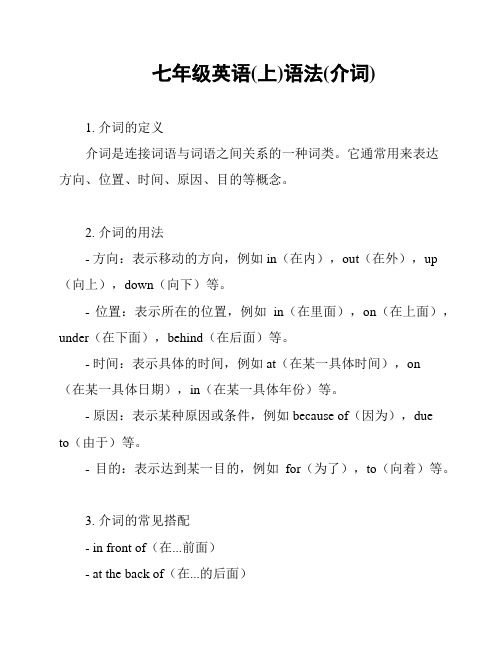
七年级英语(上)语法(介词)
1. 介词的定义
介词是连接词语与词语之间关系的一种词类。
它通常用来表达
方向、位置、时间、原因、目的等概念。
2. 介词的用法
- 方向:表示移动的方向,例如in(在内),out(在外),up (向上),down(向下)等。
- 位置:表示所在的位置,例如in(在里面),on(在上面),under(在下面),behind(在后面)等。
- 时间:表示具体的时间,例如at(在某一具体时间),on
(在某一具体日期),in(在某一具体年份)等。
- 原因:表示某种原因或条件,例如because of(因为),due
to(由于)等。
- 目的:表示达到某一目的,例如for(为了),to(向着)等。
3. 介词的常见搭配
- in front of(在...前面)
- at the back of(在...的后面)
- on the left/right(在左边/右边)
- at the top/bottom of(在顶部/底部)
- by bus/train/bike(乘坐公交车/火车/自行车)
- at school/home/work(在学校/家里/工作)
- because of(因为)
- due to(由于)
- for example(例如)
- to the park(去公园)
- etc.
4. 介词的注意事项
- 介词通常跟随名词、代词或动名词使用。
- 介词在句子中起连接词语的作用,不能单独使用。
- 介词的用法需要根据具体语境理解。
以上是七年级英语(上)语法(介词)的简要介绍,希望对您有所帮助!。
初中语法大全讲解--介词
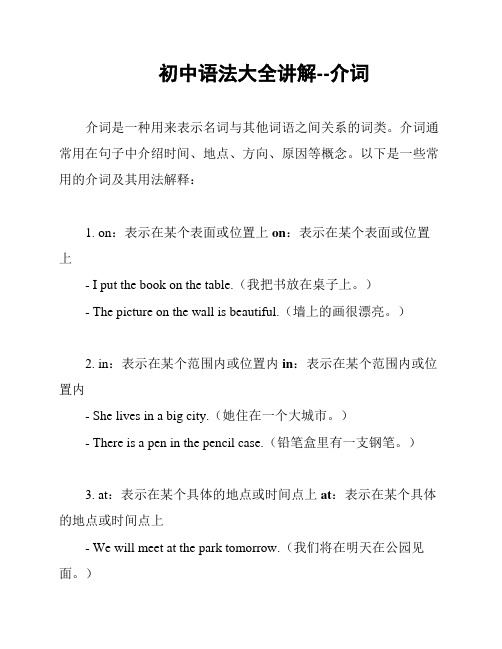
初中语法大全讲解--介词介词是一种用来表示名词与其他词语之间关系的词类。
介词通常用在句子中介绍时间、地点、方向、原因等概念。
以下是一些常用的介词及其用法解释:1. on:表示在某个表面或位置上on:表示在某个表面或位置上- I put the book on the table.(我把书放在桌子上。
)- The picture on the wall is beautiful.(墙上的画很漂亮。
)2. in:表示在某个范围内或位置内in:表示在某个范围内或位置内- She lives in a big city.(她住在一个大城市。
)- There is a pen in the pencil case.(铅笔盒里有一支钢笔。
)3. at:表示在某个具体的地点或时间点上at:表示在某个具体的地点或时间点上- We will meet at the park tomorrow.(我们将在明天在公园见面。
)- He is waiting for you at the front door.(他在门口等你。
)4. to:表示朝向某个目标或对象to:表示朝向某个目标或对象- She walked to school.(她走向学校。
)- Can you pass the book to me?(你能把书递给我吗?)5. with:表示伴随或使用某个工具或对象with:表示伴随或使用某个工具或对象- I went to the park with my friends.(我和我的朋友一起去了公园。
)- He wrote the letter with a pen.(他用钢笔写了这封信。
)6. by:表示通过某种方式或交通工具by:表示通过某种方式或交通工具- We usually go to school by bus.(我们通常坐公交车去学校。
)- She sent the gift by mail.(她通过邮寄发送了礼物。
初中英语语法专题—介词讲解
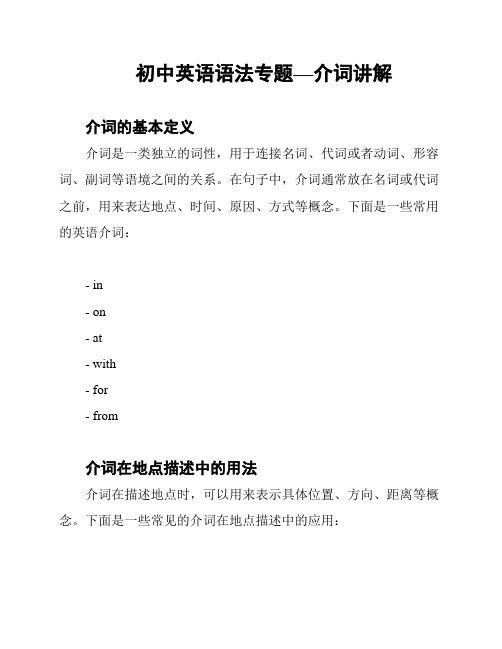
初中英语语法专题—介词讲解介词的基本定义介词是一类独立的词性,用于连接名词、代词或者动词、形容词、副词等语境之间的关系。
在句子中,介词通常放在名词或代词之前,用来表达地点、时间、原因、方式等概念。
下面是一些常用的英语介词:- in- on- at- with- for- from介词在地点描述中的用法介词在描述地点时,可以用来表示具体位置、方向、距离等概念。
下面是一些常见的介词在地点描述中的应用:- in:用于表示在某个范围之内的位置,例如 "in the room"(在房间里),"in the park"(在公园里)。
- on:用于表示在表面、平台或者位置上的状态,例如 "on the table"(在桌子上),"on the bus"(在公交车上)。
- at:用于表示在某个具体位置或者地点,例如 "at the cinema"(在电影院),"at school"(在学校)。
- to:用于表示朝向某个位置的移动,例如 "go to the park"(去公园)。
介词在时间描述中的用法介词在描述时间时,可以用来表示具体时间、时间段等概念。
下面是一些常见的介词在时间描述中的应用:- at:用于表示具体的时间点,例如 "at 7 o'clock"(在7点钟)。
- on:用于表示具体的日期或者星期几,例如 "on Monday"(星期一),"on January 1st"(1月1日)。
- in:用于表示较长的时间段或者某一个时间段内,例如 "inthe morning"(早上),"in July"(在七月)。
介词在原因描述中的用法介词在描述原因时,可以用来表示某事的起因或者原因。
初中英语语法介词

初中英语语法介词介词在英文中是一种虚词,在英语里面的使用频率特殊高。
下面是学习啦我为你整理的初中英语的介词语法,希望大家宠爱!常用介词的用法1. 在的前面in front of (范围外的前面)in the front of (在范围内的前面)There is a river ________ my house.我家前面有一条河。
There is a blackboard ___ our classroom .教室前面有一块黑板。
2.在树上on the tree 强调树上长出的东西(苹果,橘子)in the tree 外来物体(人,鸟,风筝)There are some birds _____ the tree.树上有一些鸟。
There are some apples _______ the tree.树上有一些苹果。
3.时间表达:in + 某月/ 某季节/ 某年(时间长)on + 某天(中)at + 具体几点几分(短) 固定短语:in the morning / afternoon / evening at night, at noon练习:__January , __ summer, ___ 2021______ Sunday, ___ March 4th, ___ March___ _ Sunday morning,_____ the morning_______ the morning of June 5th_______ 6:30, ____ night, __ noon4.在墙上on the wall在墙壁外表(相片photo,图画picture)in the wall在墙壁的里面(门door, 窗户window )(1)There is a photo of my family_______ the wall.(2)There are two doors ______ the wall.5. 在之上on:在的外表之上(物体之间有接触)over: 在的正上方(物体没有接触)above 高于......;在......之上',多指在相对较高位置(1)There is a book ______ the desk.书桌上有一本书。
初中英语语法专题讲座12——介词

这三个介词都可以表示地点,意思是“在……上”,但具体含义有所不同。
⑴on是指与物体表面接触而不是在其上方。例如:They are sittingonthe grass.他们坐在草地上。Do you liveonthe second floor?[美国英语]你住在二楼吗?/[英国英语]你住在三楼吗?He jumpedonthe horse.他跳上了马。
⑵介词短语用作宾语补足语,例如:I was surprised to find himon the bus.发现他在公共汽车上,我很吃惊。Please make yourselfat home.请随便一点,不要拘束。
⑶介词短语用作后置定语,例如:The girlin the hatis my sister.那个头戴帽子的女孩是我的妹妹。Do you like the jacketon the left?你喜欢左边的那件短上衣吗?Did you see the housewith many trees around it?你看到那座周围长满树的房子了吗?
7.instead, instead of:
⑴instead不是介词,而是副词。它的意思是“作为代替;(不……)而”,中文译法灵活。instead常位于句末。例如:He was ill, so I wentinstead.他病了,因此我就(代他)去了。I don’t like this one; please give me thatinstead.我不喜欢这一个,请把那一个给我。They don’t have beef; let’s have some fishinstead.他们没有牛肉,我们改吃鱼吧。
2.during, in:
两者用作介词时均与表示一般时间的名词连用,意为“在…期间”,一般情况下能相互换用。但是,在实际运用中应注意下面几点:
初中英语语法专题讲座12——介词
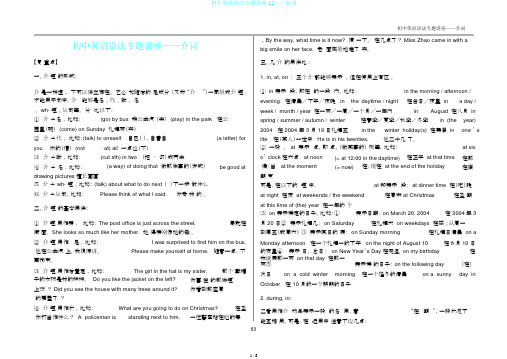
初中英语语法专题讲座——介词【复重点】一、介短的形式:介是一种虚,不可以独立存在。
它必和随后的足成分(又称“介”)一同组成介短,才能用于句中。
介能够是名、代、数、名、 wh- 短、从句等。
分比以下:⑴介+名,比如:(go) by bus 乘公共汽(去) (play) in the park 在公园里(玩) (come) on Sunday 礼拜天(来)⑵介+代,比如:(talk) to oneself 自己(),自言自(a letter) for you你的(信) (not⋯ at) all 一点也(不)⑶介+数,比如:(cut sth) in two (把⋯⋯切)成两半⑷介+名,比如:(a way) of doing that 做那件事的(方式)be good at drawing pictures 擅长画画⑸介+ wh- 短,比如: (talk) about what to do next ()下一步做什么⑹介+从句,比如:Please think of what I said.你考我的。
二、介短的基本用法:⑴介短用作表,比如: The post office is just across the street.局就在街面。
She looks so much like her mother. 她得特别像她的母。
⑵ 介短用作足,比如:I was surprised to find him on the bus.他在公共汽上,我很惊讶。
Please make yourself at home. 随意一点,不要拘束。
⑶ 介短用作后置定,比如:The girl in the hat is my sister.那个戴帽子的女孩是我的妹妹。
Do you like the jacket on the left?你喜左的那件短上衣? Did you see the house with many trees around it?你看到那座周的房屋了?⑷ 介短用作状,比如:What are you going to do on Christmas?在圣你打当作什么? A policeman is standing next to him.一位警察站在他的旁初中英语语法专题讲座——介词。
初中英语语法--介词(最新整理)

初中英语语法 --- 介词介词只能用在一个名词、代词或相当于名词的结构之前,也可以与后面的词一起构成介词短语。
介词通常位于名词或代词之前。
常见的介词用法:一.on五.其他常用介词练一练用适当的介词填空morning .2.Do the students stay home S a t u r d a y? 3.M y m o t h e r c u t t h e c a k ea knife4.We live a n e w h o u s e n o w.5.S h a n g h a i i sthe east of China.6.I usually have lunch noon.7.It’s eight o’clock.It’s time class.8.half past six , he usually has dinner.9.We have lessons eight o’clock twelve o’clock.11.There is a bridge the river.12.This is a photo my family.13.Tom comes England.14.My bed is the window.15.He looks his father.16.What's this English?17.The pen is the pencil-box.18.The bookstore is19.There are some pictures the right of our school.the wall.20.My telephone is the bed and the sofa.答案:1. at; in 2.at; on 3.with 4. in 5.in 6.at 7.for 8.At 9.from; to 10. with; by 11. over 12. of 13. from 14. near 15. like 16. in 17. in 18. on 19.on 20.between“”“”At the end, Xiao Bian gives you a passage. Minand once said, "people who learn to learn are very happy people.". In every wonderful life, learning is an eternal theme. As a professional clerical and teaching position, I understand the importance of continuous learning, "life is diligent, nothing can be gained", only continuous learning can achieve better self. Only by constantly learning and mastering the latest relevant knowledge, can employees from all walks of life keep up with the pace of enterprise development and innovate to meet the needs of the market. This document is also edited by my studio professionals, there may be errors in the document, if there are errors, please correct, thank you!。
初中英语语法---介词prep

in
through +名词表示具体的过程、手段、
+语言、材料
中介等
D. by his car; by bike
6. -How can you shop for so many things in such a short time?
- _____using the Internet.
A. In
B. On
C. For
D. By
练习
7. Jim usually _____on a trip by plane but last month he went on a trip
用by时方式前不能有任何限定词;可用by+doing表示以…方式
He makes a great progress by studying hard. This pair of shoes is made by hand.
She makes a living _b_y__s_e_ll_in_g__c_lo_t_h_e_s_. 她以卖衣服为生。
A. With
B. Through
C. By
D. Of
总结
(一)时间介词
in
+一段时间
later
on +具体某天某上下午 before
at
+时刻
ago
after
在……之后
during
在……之后 在……之前 在……之前 在……期间
总结
(二)地点介词
in
在……里面
below 在下方,一般表示抽象概念
方式介n时,交通工具为具体实物,其 前有修饰语或本身是复数。
We go to school __o_n__ the school bus.
(完整版)初中英语语法介词用法讲解与练习
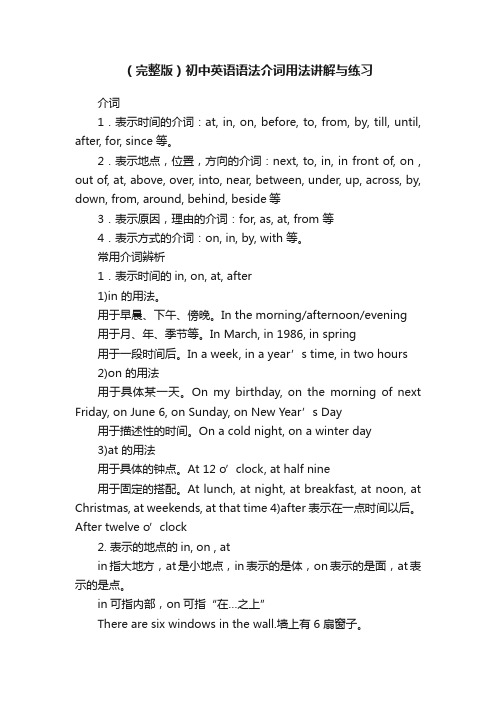
(完整版)初中英语语法介词用法讲解与练习介词1.表示时间的介词:at, in, on, before, to, from, by, till, until, after, for, since 等。
2.表示地点,位置,方向的介词:next, to, in, in front of, on , out of, at, above, over, into, near, between, under, up, across, by, down, from, around, behind, beside等3.表示原因,理由的介词:for, as, at, from 等4.表示方式的介词:on, in, by, with 等。
常用介词辨析1.表示时间的in, on, at, after1)in 的用法。
用于早晨、下午、傍晚。
In the morning/afternoon/evening用于月、年、季节等。
In March, in 1986, in spring用于一段时间后。
In a week, in a year’s time, in two hours2)on 的用法用于具体某一天。
On my birthday, on the morning of next Friday, on June 6, on Sunday, on New Year’s Day用于描述性的时间。
On a cold night, on a winter day3)at 的用法用于具体的钟点。
At 12 o’clock, at half nine用于固定的搭配。
At lunch, at night, at breakfast, at noon, at Christmas, at weekends, at that time 4)after 表示在一点时间以后。
After twelve o’clock2. 表示的地点的in, on , atin指大地方,at是小地点,in表示的是体,on表示的是面,at表示的是点。
初中英语介词语法知识点总结(讲义及答案)
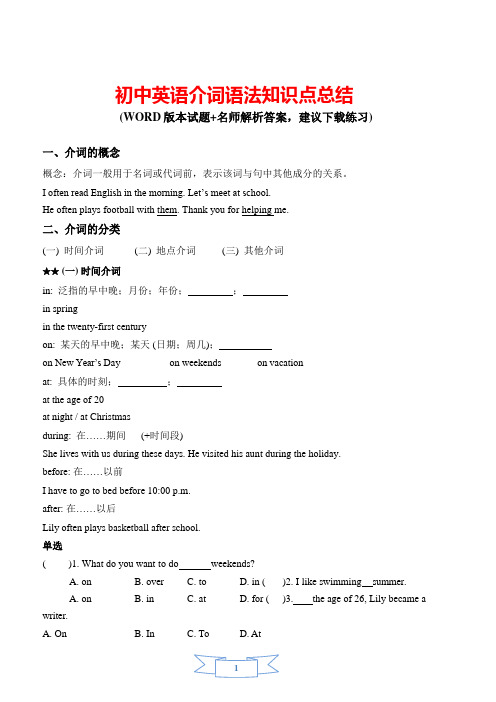
初中英语介词语法知识点总结(WORD版本试题+名师解析答案,建议下载练习)一、介词的概念概念:介词一般用于名词或代词前,表示该词与句中其他成分的关系。
I often read English in the morning. Let’s meet at school.He often plays football with them. Thank you for helping me.二、介词的分类(一) 时间介词(二) 地点介词(三) 其他介词★★ (一) 时间介词in: 泛指的早中晚;月份;年份;;in springin the twenty-first centuryon: 某天的早中晚;某天 (日期;周几);on New Year’s Day on weekends on vacationat: 具体的时刻;;at the age of 20at night / at Christmasduring: 在……期间(+时间段)She lives with us during these days. He visited his aunt during the holiday.before: 在……以前I have to go to bed before 10:00 p.m.after: 在……以后Lily often plays basketball after school.单选( )1. What do you want to do weekends?A. onB. overC. toD. in ( )2. I like swimming summer.A. onB. inC. atD. for ( )3. the age of 26, Lily became a writer.A. OnB. InC. ToD. At( )4. Jim learned to drive ___ the holiday.A. atB. duringC. toD. for( )5. He went to Shanghai July 7, 2013 and came backa cold morning last year.A. in; onB. on; inC. on; onD. in; in( )6. My mom often tells me to go back home dark(黄昏).A. afterB. toC. beforeD. for( )7. A lot of people are here _ vacation every year.A. ofB. onC. atD. with★★ (二) 地点介词1.地点介词 at, in, onat: “在……”(表一个点或小地方)at home at Mr. Cool’s Clothes Storeat the pool at Central Parkin: “在……里” (表一个范围或大地方) in China in Beijing in the water in the parkon: “在……上” (表一个表面,并接触) on the floor on the wall 对比这三个句子:They stood at the door and waited.他们站在门口等着。
英语介词用法详解(初中)

英语介词用法详解(初中)介词是一种虚词,不能独立充当句子成分,需与动词、形容词和名词搭配,才能在句子中充当成分。
介词是用于名词或代词之前,表示词与词之间关系的词类,介词常与动词、形容词和名词搭配表示不同意义。
介词短语中介词后接名词、代词或可以替代名词的词(如:动名词v-ing).介词后的代词永远为宾格形式。
一、表示时间的介词(一)表示时间段的介词(1)in , afterin +时间段,表示从现在起往后推算一段时间after +时间段,表示过去某时间往后推算一段时间,如:He’ll come back in two days. 但点钟用after( after three o’clock)He left on July 2 and returned after three days.(2)in , during表示在一段特指的时间内,可用in 或duringThe work was done in / during the holidays.表示年份、月份、季节用in , 如:in 1999 ,in June , in winter(3)in last, for the past + 时间段, during表示在最近一段时间内,句中谓语动词常用现在完成时I have been in Shanghai in the last few years.(4)for 表示延续一段时间。
I’ll study in the U.S for two yearsI’ve waited for Bingo for half an hour.(二)表示某一时间的介词(1)at, onat 表示某一时刻,on 表示某一天或日期, 如:at 7:14, on Saturday morning on the night of May2一天内各段时间表达, 选用正确的介词,请比较:in the morningon a winter / snow / cold / morningat nighton the night of March 7thin the eveningon Friday evening(2)before, bybefore 表示某一时间之前,而by 表示到某一时间止,句中谓语动词多用完成时态。
初中中的介词用法详解

初中中的介词用法详解介词是一种连接词,在句子中起连接作用,用来表示人、事、物之间的关系。
它在语法中扮演着重要的角色。
在初中阶段,学生们需要掌握常见的介词及其用法,以正确地运用介词,表达清晰准确的意思。
下面将详细介绍初中中的介词用法。
一、介词的基本概念介词是一种虚词,它不能独立作句子的成分,必须与其他词语结合使用。
它可以用于表示时间、地点、方向、原因、目的、手段等关系。
二、表示时间的介词1. at:用于表示具体的某一点时间,比如at 7 o'clock、at noon。
2. on:用于表示某一天、某一日期,比如on Monday、on March 1st。
3. in:用于表示某一段时间、某一年份,例如in the morning、in 2022。
三、表示地点的介词1. in:用于表示大范围的地点,如in China、in the kitchen。
2. on:用于表示具体的平面或位置,如on the table、on the left。
3. at:用于表示具体的位置或地点,如at the bus stop、at the cinema。
四、表示方向的介词1. to:表示朝向某个地点或目的地,例如go to school、send the letter to her。
2. from:表示从某个地点或源头出发,例如come from Japan、receive a gift from my friend。
五、表示原因的介词1. because of:表示由于某个原因,如failed the exam because of laziness。
2. due to:表示由于某个原因产生的结果,例如missed the train due to the traffic jam。
六、表示目的或用途的介词1. for:用于表示目的或用途,例如study hard for a good future、buy flowers for my mother。
英语介词讲解

英语介词讲解介词(preposition)是一种用来连接名词、代词或名词短语与其他词或短语的词类,在句子中常常表示位置、方向、时间、关系等。
以下是一些常见的英语介词及其用法:1.in:表示在某个位置、地点、范围或状态之内。
例如:in the room(在房间里)、in London(在伦敦)、in the book(在书中)等。
2.on:表示在某个平面、表面、方向或日期上。
例如:on the table(在桌子上)、on the wall(在墙上)、on Monday(在星期一)等。
3.at:表示在某个点、时间、活动或事件上。
例如:at the park(在公园)、at 8 o'clock(在8点)、at the party(在聚会上)等。
4.by:表示通过某种方式、手段或时间。
例如:by car(乘车)、by email (通过电子邮件)、by Friday(到星期五)等。
5.for:表示为某个目的、目标或时间段。
例如:for you(为你)、for two hours(两个小时)、for breakfast(作为早餐)等。
6.to:表示朝向某个地点、目的地或对象。
例如:to the park(到公园)、to the store(到商店)、to you(给你)等。
7.from:表示起点、来源或运动方向。
例如:from the house(从房子里)、from London(从伦敦)、from Monday to Friday(从星期一到星期五)等。
8.with:表示伴随、附带或使用某物。
例如:with my friend(和我的朋友一起)、with a pen(用一支笔)、with pleasure(乐意)等。
9.about:表示关于某个主题、话题或方面。
例如:about the book(关于这本书)、about the weather(关于天气)、talk about(谈论)等。
10.of:表示属于、关于或由某物组成。
初中英语语法基础——介词专题讲解 (附同步练习试题)
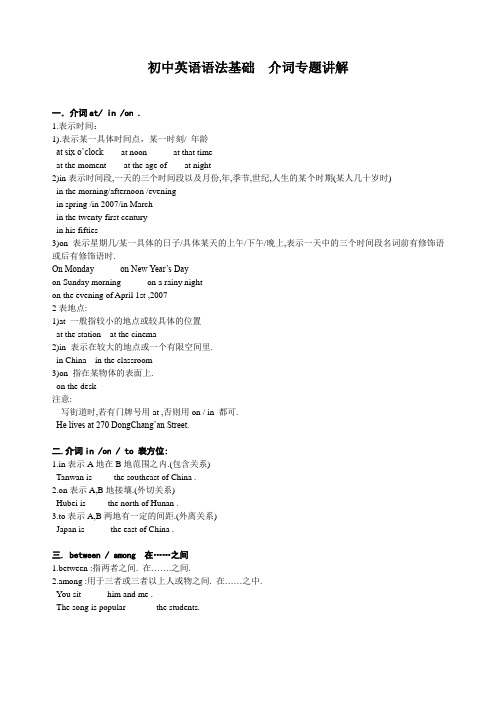
初中英语语法基础介词专题讲解一.介词at/ in /on .1.表示时间:1).表示某一具体时间点,某一时刻/ 年龄at six o’clock at noon at that timeat the moment at the age of at night2)in表示时间段,一天的三个时间段以及月份,年,季节,世纪,人生的某个时期(某人几十岁时)in the morning/afternoon /eveningin spring /in 2007/in Marchin the twenty-first centuryin his fifties3)on表示星期几/某一具体的日子/具体某天的上午/下午/晚上,表示一天中的三个时间段名词前有修饰语或后有修饰语时.On Monday on New Year’s Dayon Sunday morning on a rainy nighton the evening of April 1st ,20072表地点:1)at 一般指较小的地点或较具体的位置at the station at the cinema2)in 表示在较大的地点或一个有限空间里.in China in the classroom3)on 指在某物体的表面上.on the desk注意:写街道时,若有门牌号用at ,否则用on / in 都可.He lives at 270 DongChang’an Street.二.介词in /on / to 表方位:1.in表示A地在B地范围之内.(包含关系)Tanwan is ____ the southeast of China .2.on表示A,B地接壤.(外切关系)Hubei is ____ the north of Hunan .3.to表示A,B两地有一定的间距.(外离关系)Japan is _____ the east of China .三. between / among 在……之间1.between :指两者之间. 在…….之间.2.among :用于三者或三者以上人或物之间. 在……之中.You sit _____ him and me .The song is popular ______ the students.四.after / in 在……之后 before / in 在……之前1. after1)after + 时间段. 表示以过去某一时刻为起点的一段时间之后, 用于过去时.2)after 作介词. after doing sth.2.in +一段时间. 表示说话时或以现在为起点的将来一段时间之后.用于将来时.He came back ______ two days .He will go home___finishing his homework .He will come back _____ two days .3. before 多用于时间点或一件事之前发生,即“先于……;在……之前”He left the office bofore I got there. I’ll be back before five o’clock.4. ago 时间段+ ago 表示“多久之前”时态通常用:一般过去时I met Tom two days ago.五.with / in / by 表示“用……”1.with 表示“用…” 一般指有形的工具/ 手段/ 人体器官.He cut the apple into halves ____ a knife .注: with 表伴随, “带有,含有”He came in _____ a big smile on his face .2.in表示用某种语言,方式,途径. 或书写/绘画所用的材料. 也可表交通方式.Can you say it _____English ?He wrote a letter ____ blue ink .3.by表示乘坐交通工具, 表示方式,方法I study for a test _____ working with a group .He makes a living ____ selling newspapers .注意: 同义词组1).by phone = on the phone2).by car = in a car3).in pen = with a pen = with pens六.across / through / over / by 经过1.across 指横穿,穿过. 表示动作从某一物体表面上经过.2.through 指穿过,透过,表示从某一物体空间内通过.3.over 表示从某人或某物的上空经过或越过,不与表面接触.4.by 表示从某人/某物的旁边经过.Can you swim ______ the river ?the elephant is so big that it can’t go _____ the gate .I don’t think anyone can jump ___ the fenc e.I walked _____ the bank of China yesterday .七.in front of / in the front of1.in the front of 表示在…….内部的前面2.in front of 表示在……外面的前面There is a desk in _____ front of our classroom .There is a big tree in _____ front of our classroom.八.其它介词的用法:1.at的其它用法.1).表示“从事或正在做某事”,其后加的名词往往不加冠词.She is at work now = She is working now .2)at表示“价格或速度”The train ran at 120 kilometers an hour .2.in的其它用法:1)in表示“在……方面”词组:do well in = be good atbe weak in2)in 表示“穿着”后接表颜色的词或衣服.词组: be in +衣服= be wearing +衣服3)in作副词, “在家” = at home3.like 的用法:1).像/和……一样. 常与系动词连用.词组: look like sound like2).与what 连用, “是什么样子, 怎样”.What is he like ? He is kind .4.off的用法:1).从……下来, 脱离某物体.词组: fall off2). “休假”通常放在时间名词之后.词组: have +时间+ offHe has n’t had a night off for two hours .5.except / besides1).except 除了…….之外, 都……. . 不包括在范围之内.注: nothing but … 除了……之外,什么也没有.2).besides除了……之外,还有…… . 包括在范围之内.We all went swimming ______ Lucy .There is _______ a letter in the box .We study Japanese and French____ English .6.with / without1).with具有,含有反义词: without 没有词组: with the help of = with one’s help =because of = thanks towithout one’s help2).without 的用法:A).without + sb./ sth. 没有某人或某物B).without + doing sth . He lef t here without____(say ) “Goodbye”to usC). without sth 常与if 引导的否定的条件句.If there is no water , we can’t live .= We can’t live ______ _______ .7.on the tree /in the treeon the tree 表示“树上本身长的东西” 在树上.in the tree 表示“外界的物体进入树中” 人或物在树上.There are some apples _____ the tree .There is a boy ____ the tree.8.表示“数量的介词”about , round around , over1). about , round around表示“大约……”2).over 表示“超过”= more than.9.inside / outsideInside 在……里面------反义词:outside在….外面10.in the wall /on the wallin the wall 表示“门窗在墙上” on the wall 表示“某东西张贴或挂在墙上”九.不用介词的情况:1).当时间状语为: tonight, today, yesterday, tomorrow 等时,不用介词. What are you going to do tonight ?2).含有this, that, these, those, last, next, every/each day等时间状语.He went to Wuhan last week . I drink milk every day.3).以all 开头的时间状语前面不用介词.He has worked all day .4).以some ,any, one 等构成的时间状语前不用介词.He met a bad man one cold morning. = He met a bad man on a cold morning.介词专题小测:一、单项选择题。
初中英语知识点归纳介词的分类和用法
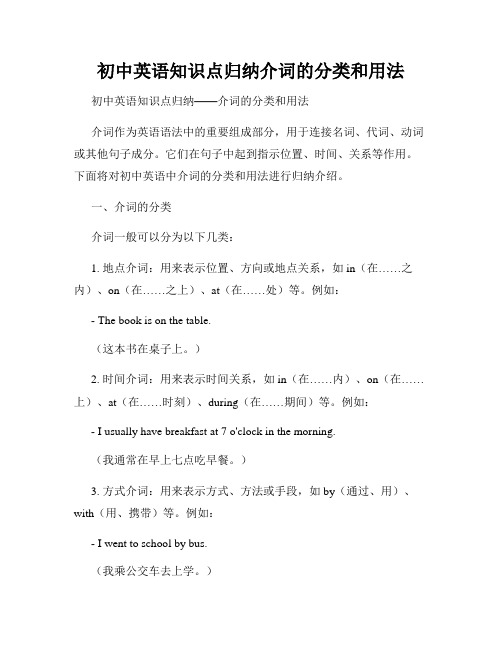
初中英语知识点归纳介词的分类和用法初中英语知识点归纳——介词的分类和用法介词作为英语语法中的重要组成部分,用于连接名词、代词、动词或其他句子成分。
它们在句子中起到指示位置、时间、关系等作用。
下面将对初中英语中介词的分类和用法进行归纳介绍。
一、介词的分类介词一般可以分为以下几类:1. 地点介词:用来表示位置、方向或地点关系,如in(在……之内)、on(在……之上)、at(在……处)等。
例如:- The book is on the table.(这本书在桌子上。
)2. 时间介词:用来表示时间关系,如in(在……内)、on(在……上)、at(在……时刻)、during(在……期间)等。
例如:- I usually have breakfast at 7 o'clock in the morning.(我通常在早上七点吃早餐。
)3. 方式介词:用来表示方式、方法或手段,如by(通过、用)、with(用、携带)等。
例如:- I went to school by bus.(我乘公交车去上学。
)4. 原因介词:用来表示原因、目的或理由,如for(因为、为了)、because of(因为)等。
例如:- He was absent from school because of illness.(他因为生病缺课了。
)5. 目的介词:用来表示目的、结果或效果,如for(为了)、to(为了、到……去)等。
例如:- We study hard for good grades.(我们努力学习是为了取得好成绩。
)6. 关系介词:用来表示关系、连接或起始点,如of(……的)、from(从……来)等。
例如:- The capital of China is Beijing.(中国的首都是北京。
)7. 引导介词:用来引导特定的短语或句子结构,如with(与……一起)、without(没有)等。
例如:- I can't live without my phone.(没有手机,我无法生活。
初中英语语法复习之介词讲解-(共50张PPT)
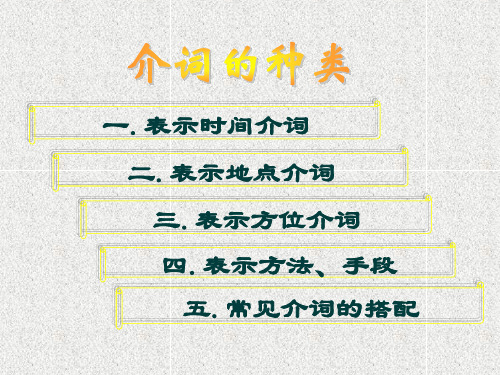
8.in a read coat, the girl in yellow, the boy in white…
3. in English , in French , in your own words, in three language… ____使_用_语__言_用__介_词__in_______
4. in a loud voice, in a low voice… ___使__用_声_音__用_介_词__i_n_____
A. on, over B.above, on C.over, on 5.The sun rose ___the horizon(地平线).
A. on B. above C.over 注意: on 接触平面
over 在平面的正上方 above 在上方
3. in + 大地方 at + 小地 方 on +门牌,某层楼
in space…
____表__示__大__地__方__用__i_n______
❖ 3. in the box, on the chair, under the desk, next to Kate, on the right of Lucy, in front of the house, behind the door…
介词:通常用在____代_词____、___名_词___、__动_名__词__
之前,表示某个人、事物/东西、事件与 另一个之间的___关__系____。
【中考英语语法汇总】介词语法讲解
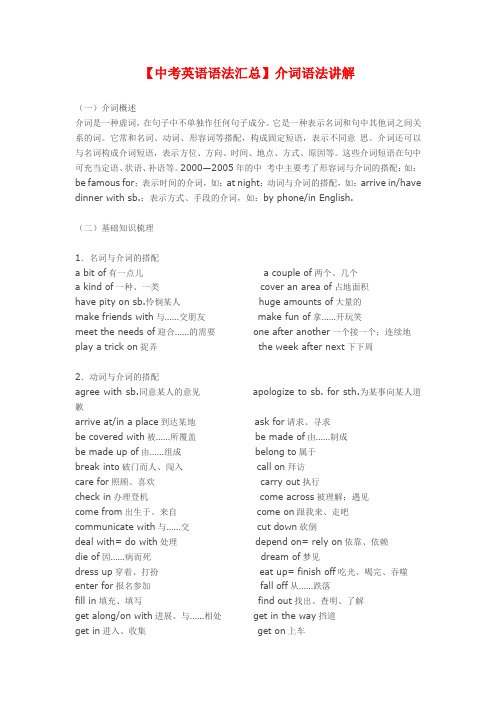
【中考英语语法汇总】介词语法讲解(一)介词概述介词是一种虚词,在句子中不单独作任何句子成分。
它是一种表示名词和句中其他词之间关系的词。
它常和名词、动词、形容词等搭配,构成固定短语,表示不同意思。
介词还可以与名词构成介词短语,表示方位、方向、时间、地点、方式、原因等。
这些介词短语在句中可充当定语、状语、补语等。
2000—2005年的中考中主要考了形容词与介词的搭配:如:be famous for;表示时间的介词,如:at night;动词与介词的搭配,如:arrive in/have dinner with sb.;表示方式、手段的介词,如:by phone/in English.(二)基础知识梳理1.名词与介词的搭配a bit of有一点儿 a couple of两个、几个a kind of一种、一类 cover an area of占地面积have pity on sb.怜悯某人huge amounts of大量的make friends with与……交朋友 make fun of拿……开玩笑meet the needs of迎合……的需要 one after another一个接一个;连续地play a trick on捉弄 the week after next下下周2.动词与介词的搭配agree with sb.同意某人的意见 apologize to sb. for sth.为某事向某人道歉arrive at/in a place到达某地 ask for请求、寻求be covered with被……所覆盖 be made of由……制成be made up of由……组成 belong to属于break into破门而人、闯入 call on拜访care for照顾、喜欢 carry out执行check in办理登机 come across被理解;遇见come from出生于、来自 come on跟我来、走吧communicate with与……交cut down砍倒deal with= do with处理depend on= rely on依靠、依赖die of因……病而死dream of梦见dress up穿着、打扮 eat up= finish off吃光、喝完、吞噬enter for报名参加fall off从……跌落fill in填充、填写 find out找出、查明、了解get along/on with进展、与……相处 get in the way挡道get in进入、收集 get on上车get off下车 get rid of摆脱get ready for为….作准备 get to到达get tired of对……感到厌倦 go in for参加、从事于、酷爱,'^ go ahead先走、向前走;去吧 go for a swim去游泳go on a diet实行节食 go over复习go on with继续做某事 grow up长大、成长hand in上交 hear from收到……的来信hear of听说 help sb. with sth.帮助某人做某事hold on等等(别挂电话)hold up举起hurry off匆忙离开join.n参加、加入keep... from使……不做 keep in touch with与……保持联系keep off阻挡;不让接近 knock over撞倒、撞翻later on过来;后来 laugh at嘲笑learn.., from向……学习 leave for动身去let out放出 line up整队;排成行live on靠……为生look after照顾;照料look at看;观看 look for寻找look forward to期待着 look like看上去像;显得look out of从……朝外看look up查寻;抬头看make out辨认出make up one's mind下决心meet with遭遇 operate on sb.为……动手术pay for付……钱 pick out拾起play with玩弄point at指向;指着point out指出praise sb. for sth.为某事表扬某人prefer... to(比起……来)更喜欢 prepare for准备protect... from保护……免受 pull down推倒put off延期put on穿;戴上;上演put out伸出 put up举起;挂起run after追捕;追踪 run away逃跑search for搜寻;搜查see off为……送行sell out售完 set out/off for出发去……;起程去……set up建立;设立. shake hands with与……握手share with与……分享show off炫耀show sb around带某人参观 shut up住口speed up加快速度stop...from阻止……做take away拿走 take care of照料take charge of负责;管理;take hold of抓住take in吸入 take off脱掉(衣物等);起飞take out取出take part in参加take up开始从事 talk about谈到talk to/with与...谈话 tell... from区别;分辨think of想起;想到 think over仔细考虑throw away扔掉 tie up捆绑try on 试穿turn down(把音量)调低turn into变成 turn off关掉(电灯、电视、收音机等)turn on开,旋开(电灯、电视、收音机等) turn over翻车;翻阅;翻身turn out结果是;证明是 wake up醒来;叫醒wait for等待;等候 write down写下work out算出;制定出经典例题:1.The foreigners arrived __________Shanghai __________ night.A. at…atB. in…atC. in... inD. at... in2. Wushu is becoming more and more popular __________ westerners.A. amongB. betweenC. inD.within3. __________ the help of the teachers, we decorated. Ourclassroom__________lanterns, flowers and pictures yesterday.A. Under... withoutB. Under... amongC. With... withD.With...between4. The cakes __________ the shape of a round moon is called mooncakes.A. likeB. look likeC. asD. likes5.改错:The manager told his secretary that he would be back __________ three-thirty.A. inB. afterC. beforeD. at6. It was clever __________ the boy to work __________ the mathsproblems in less than ten minutes.A. for…outB. of... outC. for...onD. of... on7. My aunt Jane tried her best to reduce her weight ________ 6kg.A.about B.at C.to D.by8. In my opinion, I agree __________ you __________that.A. to… withB. with…toC. with.., withD. with.., on9. I am familiar__________ this school since I have worked here for morethan fifteen years.A. withB. toC. aboutD. of10. Would you please look __________ my baby girl __________ myabsence?A. after…duringB. for…duringC. after… inD. to...in11. Mexico is ________ the south of America.A. inB. toC. onD. of12. The boy ____ the bike is Jackie Hu from Britain.A. byB. onC. inD. with13. Smoking and drinking are not good _______ your health.A. forB. toC. ofD. at14. Can you see the cat hiding __________ the tree?A. onB. underC. overD. in15. The litter bin__________ the corner of the room is a present from mybrother.A. atB. onC. inD. among16. It's fun to see a large number of stars shining in the sky ________ aclear night.A. atB. inC. onD. of1. 【解析】答案是B。
初中英语语法讲解——介词
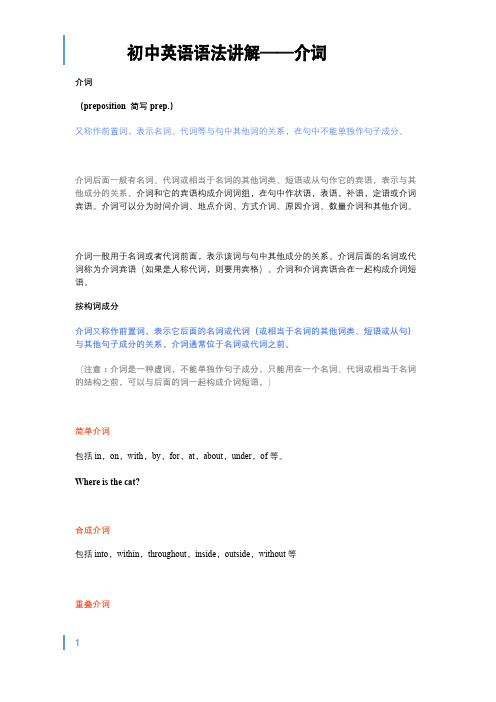
初中英语语法讲解——介词介词(preposition 简写prep.)又称作前置词,表示名词、代词等与句中其他词的关系,在句中不能单独作句子成分。
介词后面一般有名词、代词或相当于名词的其他词类、短语或从句作它的宾语,表示与其他成分的关系。
介词和它的宾语构成介词词组,在句中作状语,表语,补语,定语或介词宾语。
介词可以分为时间介词、地点介词、方式介词、原因介词、数量介词和其他介词。
介词一般用于名词或者代词前面,表示该词与句中其他成分的关系。
介词后面的名词或代词称为介词宾语(如果是人称代词,则要用宾格)。
介词和介词宾语合在一起构成介词短语。
按构词成分介词又称作前置词,表示它后面的名词或代词(或相当于名词的其他词类、短语或从句)与其他句子成分的关系。
介词通常位于名词或代词之前。
(注意:介词是一种虚词,不能单独作句子成分,只能用在一个名词、代词或相当于名词的结构之前,可以与后面的词一起构成介词短语。
)简单介词包括in,on,with,by,for,at,about,under,of等。
Where is the cat?合成介词包括into,within,throughout,inside,outside,without等重叠介词from among 从...当中from behind 从...后面,until after 直至...之后,at about 在大约...,after about 在大约...之后等短语介词一个或两个简单介词和一个或几个其他词类构成一个短语,作用相当于一个介词,这就叫做短语介词。
这类介词的末尾总是一个简单介词如according to,because of,by means of,in addition to,in front of,in spite of,into等。
分词介词有极少数介词的词尾是“-ing”,形似现在分词(其中也有些可做分词)。
常用的有:considering,regarding,respecting,including。
英语介词详解

英语介词详解
介词在英语中是一种虚词,用于表示名词或代词与句子其他部分之间的关系。
以下是介词的详细解释:
1.定义:介词是用于描述名词或代词与句子其他部分之间关系的词。
它们通常
放在名词或代词之前,表示方向、位置、时间、方式等。
2.功能:介词的主要功能是帮助建立名词或代词与其他句子成分之间的关系,
提供更多的语境和背景信息。
3.常见介词:以下是一些常见的英语介词:at、in、on、by、with、about、
over、before、after、during等。
4.用法:介词的用法非常灵活,需要根据上下文和语境来判断。
例如,在句子
“The book is on the table”中,介词“on”表示“在……上面”;在句子“I will meet you at the train station”中,介词“at”表示“在……
地方”。
5.注意事项:使用介词时需要注意一些常见错误,如多余的介词、缺少介词或
使用不当的介词等。
正确使用介词可以提高英语表达的准确性和流畅性。
介词是英语中一个非常重要的语言元素,正确使用介词可以帮助我们更好地表达思想,建立句子之间的关系,提高语言的质量。
初中英语语法专题介词与常见短语

初中英语语法专题介词与常见短语介词(preposition 简写prep.),又称作前置词,表示名词、代词等与句中其它词的关系,在句中不能单独作句子成分。
我在这里整理了相关资料,快来学习学习吧!初中英语语法专题介词一、概念介词(preposition)表示与名词、代词等其它词的关系,不能单独做句子成分,介词后面的成分称为宾语。
二、分类介词可以用来表示时间、地点、方位、方式、手段等。
①重点词整理解析(at\in\on\by\before\after\until\for\since)at1. at+点钟at one oclock 在七点钟2. at+the+n s (shop) at the bakers (shop) 在面包店at the hairdressers (shop)在理发店3. at noon/night/midnight 在正午/夜晚/午夜4. at home/work/school/church 在家/上班/上学/做礼拜5. at breakfast/lunch/dinner 在吃早/午/晚饭6. arrive at+小地点arrive at the airport 到机场7. at+节日at Spring Festival 在春节期间8. call sb at+号码打...号码找某人9. email sb at+邮件地址发...电子邮件给某人10. call at +地点探望某个地方11. 其它固定搭配at the price/speed...of 以...的价格、速度in1. in+年、月in 20xx/May 在20xx年五月2. in+季节in Summer 在夏天3. in the morning/afternoon/evening 在早上/下午/晚上4. in+世纪in the twenty-first century 在21世纪5. in+颜色表示穿着the girl in red 穿红色衣服的女孩6. in+语言in English/Chinese 用英语/汉语7. in+声音in a weak voice 用微弱的声音8. in+时间段表示将来in five minutes 五分钟以后(划线提问用how soon)9. in+地点(大地点) in Qingdao 在青岛10. in+物体在...里面in the glass 在杯子里11. in+方向in the west 在西边12. 其它in front of 在...前面in the end 最终in the past few years 在过去的几年里on1. on+详细日期/礼拜on May 8th 在五月八日on Wednesday 在周三2. on+ 节日(带Day 的节日) on Mothers Day 母亲节3. on+地点on the table(在桌子上) on the train(在火车上)4. call on+sb call on your friend 探望你的挚友5. 表示方位(毗邻、接壤) Russia is on the north of China. 俄罗斯与中国北部相连。
- 1、下载文档前请自行甄别文档内容的完整性,平台不提供额外的编辑、内容补充、找答案等附加服务。
- 2、"仅部分预览"的文档,不可在线预览部分如存在完整性等问题,可反馈申请退款(可完整预览的文档不适用该条件!)。
- 3、如文档侵犯您的权益,请联系客服反馈,我们会尽快为您处理(人工客服工作时间:9:00-18:30)。
专题六、介词
知识概要
介词在英语中用法很活,也无一定规律可循。
常与动词构成动词短语,和名词等词构成介词短语。
在初中范围内还应学一个记住一个,特别是那些和动词的特殊搭配。
这样长期下去不断学习自然会总结出一套自己的规律来。
常用介词用法辨析
1,表示时间的介词
表示年、月、日、时刻等用at,in,on
A at用于表示时刻、时刻的某一点 e.g. at eleven o’clock \ at noon \ at present
B on用于表示星期几,某日具体到某一天,节日,某天的上午、下午、晚上,特
定的早,午,晚(在morning,afternoon,evening,night前有修饰词时,用on) e.g.
on Saturday , On March 8th, on Sunday morning, on the afternoon of March 8th , on a
cold night
C in用于表示一段时间多用在年份,季节,月份或morning,afternoon,evening前(注
意:at noon/night) e.g. in December \ in spring, in 1970, in the morning/afternoon/
evening/night
表示前后用before,after
A. before:在….之前 e.g. Come and see me tomorrow at any time before eleven a.m.
B. after:在….之后 e.g. Spring comes after winter.
表示期限等用by,until,till
A, by:在….之前,不迟于 e.g. By the time I arrived, she had already gone.
B,Until,till:直到….为止 e.g. The radio worked all night till last night.
表示期间等用for,during等
A.for:达….之久(表示过了多少时间,多用how long 提问)e.g. My Johnson stayed
in China for 2 weeks.
B.during:在…时期当中 e.g. He woke many times during the night.
表示时间的起点用from,since
A.from:从….起 e.g. From sunrise to sunset he waited.
B.since:自从….以来 e.g. Since my last letter I have heard from him twice.
表示时间的经过等用in,等
in:过….后(未来时间,多用how soon提问) e.g. I heard that she would be back in a month.
2,表示地点、方向的介词
表示场所的介词:at,in,on,under,below,near,by,between---and,among,around,round,in front of,behind,across from,next to
e.g. There are many trees around the lake.
【注】表示“某地在….里”时要用in;表示“某地在另外一地某方向”时要用on或to;如果两地有空间距离(不接壤)时,必须用to. 如,
Taiwan is in the southeast of China.台湾位于中国的东南部。
Taiwan is to the south of Fujian 台湾在福建的南部。
Laiwu is on the east of Taian 莱芜在泰安的东部。
表示方向的介词:in,into,out of,along,down,across,through,to,towards,for,from,over,by,past
e.g. You must put the dirty paper in the basket.
【注】across和through的区别:across 从------的表面穿过,through从------的内部穿过。
表示游渡,乘船过海或过河时用across.如,
The river runs through the city. Go across the bidge, you’ll find the park
3,表示原因的介词短语because of
e.g. Because of her illness my grandma stayed in bed for a week.
【注】because, because of 的区别:because是连词后接从句,如,
my grandma stayed in bed for a week because she was ill.
4,with, in ,on
3表示手段和材料等用法的介词:with,in,by
1),with:和…在一起,带有、具有,用某种具体工具、材料或人体器官
I believe it with my eyes. He is cutting paper with a knife .Can I write the exam paper
with a pen
2),in:以…形式,以…方式;用…语言/声音,表示穿------衣着,用墨水、颜料等原料等。
e.g. She keeps a diary in English.
3)by:用------手段或方式。
如,The old man had to make a living by selling vegetables
在交通工具前加介词by,但不能再有任何指示代词或冠词,否则要改换相应的介词。
by taxi=in a taxi by train=in a train by bike=on a bike by ship=on a ship by boat=in a boat by bus=on a bus by plane=on a plane by air 空运by land 陆运 by sea 海运on foot 5,表示“由….制成”的介词:of,from
A.of:表示成品看得出原材料 e.g. The table is made of wood.
B.from:表示成品看不出原材料 e.g. This kind of paper is made from wood.
6, beside, besides, exept
beside 是"在……旁边",如:The students stood beside their teachers.而besides是"除……之外,不仅……而且……,除了……以外还有……",如:I studied English besides French, when I was in college. 而except 则是除------之外(不再有),如:I come here every day except Sunday. Everyone else in my class was invited except me.
7.表示其他的介词:without,like,as,against等
A.without:没有 e.g. He rushed to the office without having his breakfast.
B.like:像,如,跟…一样 e.g. What’s he like?
C.as:作为 e.g. He is famous as a scientist here.
D.against:靠着,反对 e.g. Don’t stand against the door. We are against building a
new zoo in our city.。
